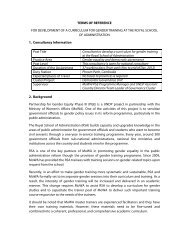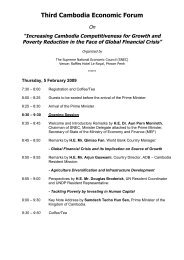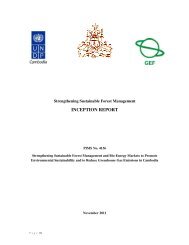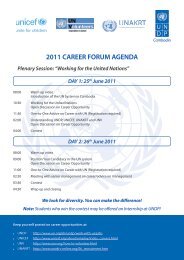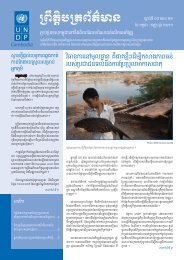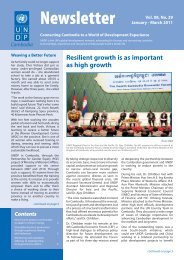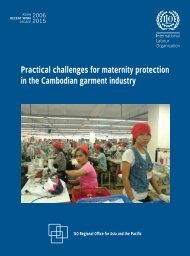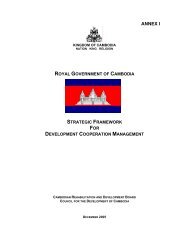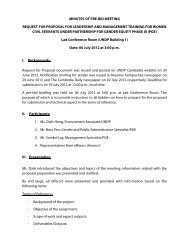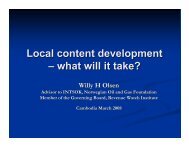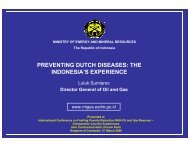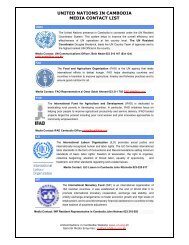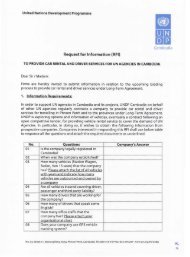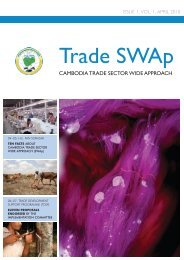UN Analysis Final.pdf - United Nations in Cambodia
UN Analysis Final.pdf - United Nations in Cambodia
UN Analysis Final.pdf - United Nations in Cambodia
Create successful ePaper yourself
Turn your PDF publications into a flip-book with our unique Google optimized e-Paper software.
VIII<br />
YOUTH<br />
PARTICIPATION<br />
AND RIGHTS<br />
Between the 1970s and 1980s, <strong>Cambodia</strong>’s youths were drawn <strong>in</strong>to the civil war and the political<br />
process as citizens, but were then denied their rights to education and health, and the development of<br />
their full potential as members of society. State controlled volunteerism <strong>in</strong>volved young people <strong>in</strong> the<br />
Mass Youth Organisation, which mobilized thousands of students to conduct literacy classes throughout the<br />
country dur<strong>in</strong>g school breaks (Mysliwiec 2005). The political stability that began only <strong>in</strong> the early 1990s gave<br />
them the opportunity to participate <strong>in</strong> the social, political and economic spheres. While young people take<br />
part <strong>in</strong> economic activities that benefit their households and communities, the extent to which their voices are<br />
heard and <strong>in</strong>corporated <strong>in</strong> decision-mak<strong>in</strong>g and development processes appears to have been limited.<br />
This chapter focuses on current youth participation and their right to be <strong>in</strong>volve <strong>in</strong> social and political activities.<br />
It exam<strong>in</strong>es the national legal framework for youth participation, which could support the formulation<br />
of a future National Youth Policy. It takes the view that youth participation can be the eng<strong>in</strong>e of growth for<br />
the country, if adolescents and young adults are given the opportunity to fully take part <strong>in</strong> the development<br />
process. It also explores the notion and practice of volunteerism among youth, particularly as it relates to their<br />
perceptions/attitudes and actual <strong>in</strong>volvement <strong>in</strong> the improvement of their communities.<br />
8.1 POLICIES AND PROGRAMMES SUPPORTING YOUTH PARTICIPATION<br />
IN THE DEVELOPMENT PROCESS<br />
Several national frameworks and programmes have established the rights and critical role of youth <strong>in</strong><br />
<strong>Cambodia</strong>’s development process. Article 34 of the Constitution gives <strong>Cambodia</strong>n citizens over 18 of either<br />
sex the right to vote, and to stand as candidates for election if they are at least 25. At the same time, Article<br />
31 states that the K<strong>in</strong>gdom of <strong>Cambodia</strong> shall recognise and respect human rights as determ<strong>in</strong>ed <strong>in</strong> the<br />
<strong>United</strong> <strong>Nations</strong> Charter, the Universal Declaration of Human Rights and its concomitant covenants and<br />
conventions, the CEDAW Convention on women’s rights and the Convention on the Rights of the Child. Its<br />
National Strategic Development Plan of 2006-2010 also specifies that, with 60 per cent of the population<br />
be<strong>in</strong>g below 25 years of age, youth shall constitute a critical group <strong>in</strong> advanc<strong>in</strong>g the country’s development<br />
(NSDP 2005).<br />
The Government’s Decentralisation and Deconcentration (D&D) framework opens up opportunities for<br />
the participation of youth and marg<strong>in</strong>alized groups. Aligned with the RGC’s Rectangular Strategy, this national<br />
programme strengthens local governance for development and poverty reduction. It f<strong>in</strong>ds support <strong>in</strong> the<br />
<strong>Cambodia</strong>n Organic Law of 2008, which is designed “to provide a coherent legal foundation for democratic<br />
sub-national governance based on the pr<strong>in</strong>ciples of democratic representation, participation, public sector<br />
accountability and effectiveness, and poverty reduction”. The lowest level of local government is represented<br />
by the Commune Council, which is closer to the population and reduces some of the communication and<br />
other roadblocks that underm<strong>in</strong>e youth participation.<br />
Situation <strong>Analysis</strong> of Youth <strong>in</strong> <strong>Cambodia</strong><br />
89



